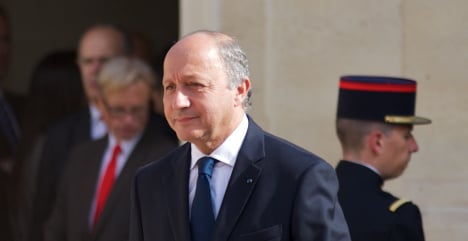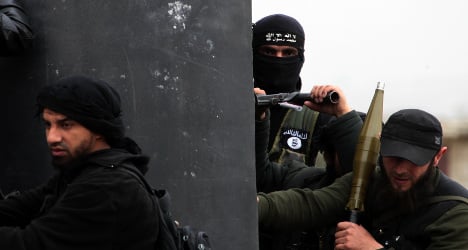France is seeking a reaction with "force" if a massacre in Syria involving chemical weapons is confirmed, French Foreign Minister Laurent Fabius said on Thursday.
"If it is proven, France's position is that there must be a reaction," Fabius told BFM-TV, speaking of a "reaction with force" while judging it "impossible" to send in ground troops.
"There are possibilities for responding," he said without elaborating.
The convulsions, pinpoint pupils and laboured breathing seen in victims of the alleged chemical attack in Syria could be symptoms of nerve gas, experts said Thursday, but only blood and urine samples
can provide proof.
The main Syrian opposition group claims that as many as 1,300 people were killed in a chemical weapons attack on Wednesday on rebel areas near Damascus – a charge the government denies.
Footage distributed by activists showed people foaming at the mouth and doctors apparently giving people oxygen to help them breathe and trying to resuscitate unconscious children.
Chemical and defence experts said the symptoms appeared consistent with exposure to a nerve agent like sarin or VX.
"A large number of symptoms definitely point in that direction," said chemical weapons expert Jean Pascal Zanders, although he said much more information was needed for a definitive conclusion.
"Yesterday… I was sceptical about the claims of nerve agent neurotoxicants, I have revised my position on that a bit on the basis of footage I have seen later in the day where a number of symptoms consistent
with organophosphorus poisoning" were apparent.
Ground troops impossible
In June, Fabius had raised the possibility of using military force against chemical arms production centres after France confirmed that Damascus had resorted to such weapons.
But on Thursday the foreign minister said there was "no question" of sending in ground troops, adding "it's impossible."
If Wednesday's attack is confirmed, "I believe it cannot go without a reaction from those who believe in international legality," Fabius said.
"If the Security Council cannot take a decision, at that moment decisions must be taken in another way. How? I would not go further," he said.
French President Francois Hollande on Thursday denounced the "likely" use of chemical weapons in Syria in telephone talks with UN Secretary General Ban Ki-moon.
Security Council members are seeking "clarity" on the suspected chemical weapons attack.
But diplomats said the council did not adopt a formal declaration because of opposition from Russia and China, which have for the last two years blocked any condemnation of their ally in Damascus.
"The Russians must assume their responsibilities," Fabius said.
"We are in a phase where it must be believed that the Security Council members are consistent. All said that chemical weapons should not be used. They all signed an international accord which bans their use, including the Russians," he said
British Foreign Secretary William Hague said on Wednesday that he hoped the alleged chemical weapons attacks in Syria would "wake up" President Bashar al-Assad's supporters to the nature of his
regime.
"I hope all members of the (UN) Security Council will join us," he told reporters before talks in Paris with French counterpart Fabius. "I hope this will wake up some who have supported the Assad regime, to realise
its murderous and barbaric nature."
His comments came as the Security Council prepared to meet over claims from the main Syrian opposition group that as many as 1,300 people were killed in chemical weapons attacks Wednesday on rebel areas near Damascus.
Paris and London were to send a joint letter to the secretary general asking him to order the team of UN experts in Syria to go to the scene to investigate.
"We hope that the UN team will be given immediate and unrestricted access to this area to try to establish the truth," Hague said.
"There is no reason for them to not be given access to an area a few miles away from where they are."
Fabius also called for UN inspectors to be given "immediate" access to the sites of the alleged attacks.



 Please whitelist us to continue reading.
Please whitelist us to continue reading.
Member comments